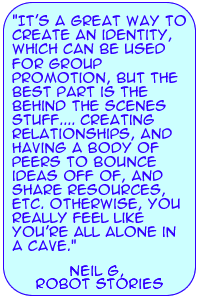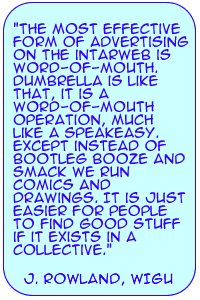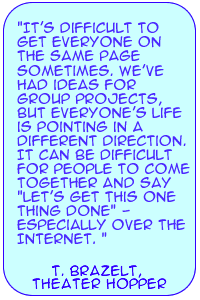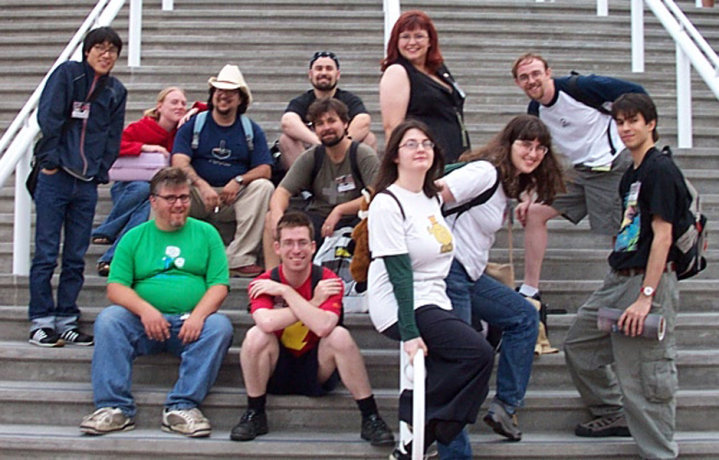Syndicates, groups, hubs, and collectives.
Despite the fact that few of them ever meet face to face, webcomickers seem to crave community and camaradie. To this end, some webcomickers seek out like-minded creators, and form groups. Some of these groups are meant to do little more than offer comfort and a sense of community, while others are meant to expand reader bases, and occasionally even make money.
This feature takes offers a snapshot of some of the perks and drawbacks of collectives, and then offers a list of these joined creative masses in the event that you’ve just been itching to be assimilated by someone… anyone.
Some of the Advantages
1) Community: “It’s a great way to create an identity, which can be used for group promotion” writes Neil G., founder of DayFree Press, “but the best part is the behind the scenes stuff…. creating relationships, and having a body of peers to bounce ideas off of, and share resources, etc. Otherwise, you really feel like you’re all alone in a cave.”
2) Exposure: Among the other advantages, explains David Wright, founder of the newly launched Collective Inkwell, is “the chance to showcase your work in front of people who might not otherwise know your stuff, and getting to collaborate with other artists.”
Jeff Rowland, creator of WIGU, and member of the loose collective called Dumbrella, agrees. “The most effective form of advertising on the intarweb is word-of-mouth. Dumbrella is like that, it is a word-of-mouth operation, much like a speakeasy. Except instead of bootleg booze and smack we run comics and drawings. It is just easier for people to find good stuff if it exists in a collective.”
3) Feedback: Theatre Hopper‘s Tom Brazelton says that one of the chief advantages of being part of a groups is getting feedback from fellow creators: ” I’ve picked up tons of useful ideas from the people in my group! It’s so much easier to get responses in this kind of environment versus sending the individual an e-mail from out of the blue.”
4) Simplification: John Morris, creator of Jeremy and webmaster for the Ape Law collective, sees working together as a way to make the lives of webcomics creators somewhat easier. “Since I act as overall webmaster, covering website maintenance issues and all,” Morris explains, “it allows the residents of Ape-Law to concentrate more on developing their art and comics or running their own business than bothering with the typical hassles of a site.”
Some of the Disadvantages
1) Lost Credibility: “In a strange way,” says Otis Frampton, creator of Oddly Normal (which used to be part of Girlamatic), “I think that webcomics that are NOT part of a group are given more “indy cred” than those that ARE. I found that I received much more feedback and many more links from other sites AFTER I took Oddly Normal solo.”
2) Unwelcome Restrictions: “Some webcomics groups have rules for how you should set up your comic, or penalties for not updating,” explains Neil G. “This can be good, or bad…. I guess if you belong to a webcomics group that carries a stigma, it can reflect badly.”
3) Time Demands: “Some people really don’t have the time to really get into the meat of what a group has to offer,” adds Neil G.. These members are generally already occupied “putting whatever energy they have into their [own] work.”
Unfortunately, when members are unable to contribute their time the work tends to fall on someone else’s shoulders. As David Wright explains, “depending on the group, you might be putting a lot of time into working on something that doesn’t do much for you.”
“Time spent working on site-related stuff,” Wright goes on to explain, “could be time spent making your own comic better, or heck, even leaving the house and doing something.”
4) Difference of Opinion: Sometimes creating a unified front for a group can be challenging. As Jon Morris explains, “the only distinct disadvantage – specific to Ape-Law, really – has been that the creators are in charge of their own directories. Because of this, the site lacks an overall unity in design, and I think folks come away from Ape-Law not necessarily feeling as if they understand what the purpose of the collective really is.”
Of course, differences of opinion can make it hard to get things done. As Tom Brazelton explains: “It’s difficult to get everyone on the same page sometimes. We’ve had ideas for group projects, but everyone’s life is pointing in a different direction. It can be difficult for people to come together and say “Let’s get this one thing done” – especially over the Internet. ”
 Making Up Your Mind
Making Up Your Mind
“Five years from now we will have lost count of the number of webcomics groups. I counted 5-10, MAYBE, before I created Dayfree press. A lot of people who showed interest in the group, but didn’t get in, went on to form/ join their own groups…. a lot of them are pretty good, too, so I think that’s awesome. I don’t know how much influence I’ve had in this trend, but it is here, and I’ve recognized at least 5 more webcomics groups in the past six months… it’s about to get exponential.” Neil G.
* Author’s note: A complete list of webcomic groups would be difficult to compile. Some come and go in a flash, while others have grow slowly over time, from a circle of friends to become full-fledged businesses. Comixpedia offers a page of links for webcomic groups and publishers. If you know of a group that has not yet been added to the list please take a moment to submit the link. In the meantime, a brief overview of a number of webcomic collectives follows.
The List
Altbrand
One of the early non-spot collectives, the Altbranders worked together to create veritable webcomic events. From Fright Night to their annual MD telethon, and their early attempt at a 24 hour comic event, Solitary Confinement, the members of this particular collective seemed to be reaching for some sort of webcomic social-consciousness.
Over the years its members have become involved in other projects, and the site became somewhat dormant, but a recent redesign may suggest that the Altbranders are active again. Membership is closed, but Altbrand events (otherwise known as Altertainment) have always been open to everyone.
Ape Law
Ape-Law began as a “vanity site” for comics creator John Morris, who began sharing his space with friends when they began “having difficulty with [their] free-server online archive.” After several more additions, Ape Law “became a collective by default”, says Morris.
Morris now actively pursues new creators to participate in the site, “as well as keeping an ear open for friends who need the space.”
Collective Inkwell
Collective Inkwell, recently founded by David Wright, is an online community of webcomic creators, writers, artists and photographers.
” I had tried to get in with 2 groups,” says Wright, “one which ceased to update, and another which said they would get back to me, but never did.” As a result, Wright went about creating his own group in the hopes of creating a “showcase” for the work of people whose work he liked, and providing an opportunity to “collaborate with other artists.”
Although there are no submission guidelines posted on the site, the roster has continued to evolve over the first months, and Wright appears to be open to new submissions.
Dayfree Press
The Dayfree Press “Power in Numbers” Network was founded by Neil G. nearly a year ago, after failing to be Spotted. Neil had already encountered a measure of success and visibility as the brains behind Robot Stories and Domination T-Shirts, and decided that he “could probably bring a bunch of exciting, new cartoonists together to start a webcomics group.” Ironically, the week that DayFree Press launched Neil was contacted by Keenspot, and Limited Space was born (or born again, since Neil had originally submitted the idea to Keen nearly a year before.
According to the Dayfree Press Mission Statement, “This website was created to bring a small group of web cartoonists together in order to be a stronger force on the internet”, a goal which will be achieved by “creating an identity, bringing together a community of readers and creators, and by group networking and promotion.” Neil sees the chief advantages of becoming part of such a community as being promotional, social and creative:
It’s a great way to create an identity which can be used for group promotion, but the best part is the behind the scenes stuff…. creating relationships, and having a body of peers to bounce ideas off of, and share resources, etc. Otherwise, you really feel like you’re all alone in a cave.
Dayfree Press is not currently accepting submissions, though they encourage you to watch their front page for openings.
 Drunk Duck
Drunk Duck
Drunk Duck advertises itself as “a webcomic community like no other.” DD began much like many of the other webcomic communities described here, but has evolved into a sophisticated alternative to Keenspace, offering promotion, ranking, and hosting. Membership is free for creators and readers alike, although creators can become “platinum” members for $2/month, or $12/year, which gives them increased recognition on the front page and a number of other additional uploading options. DD is paired with Buzz Comix, which advertises itself as the “the first TRUE webcomic network”. The additional exposure, and cross-pollination available between the two sites can certainly help to attract new viewers. Anyone can join, and the process is quick and easy.
Exile Comics
The members of Exile Comics came together “to form a more indie influenced comic market, in order to let the little guy get heard, and to give audiences a place to find great comics that [they] may not find otherwise.” To this end, they have created a group open to any and all webcomic creators, though they have established different levels of membership to differentiate the sorts of advantages and benefits that members receive.
For more information regarding how to join Exile Comics please see their Submission Guidelines.
Keenspot
Keenspot, the self-described “largest publisher of exclusive webcomics”, has been in operation since February 2000, and is currently home to more than 50 webcomics. Keenspot is one of the single most successful groups of its kind, but as a result, tends to be rather exclusive, and membership is by “invitation-only”. Comics which become “Spotted” are determined by the Keenspot executive, which consists of founding members Chris Crosby, Darren (Gav) Bluel, and their fellow executives Teri Crosby and Nate Stone.
In order to bring your comic to the attention of the Keen-executives, they ask that you “send an URL where your comic strip is located to keenspot @keenspot.com, along with the TITLE OF FEATURE, DESCRIPTION, CREATOR(S), and ESTIMATED NUMBER OF CURRENT READERS”, but they are quick to point out that due to the “volume of submissions that we receive, and the fact that we consider every strip very carefully, it may take weeks or longer (possibly forever) to receive a response from us if we decide to invite you to join our group.”
For those who may be frustrated with the submission process, Keenspot asks: Please be patient, and know that we’re considering it as much as we did our current members. We do not send out rejection notices, because any strip may eventually prove it’s got the goods to join Keenspot. We don’t ever rule anyone out for good.
 Modern Tales
Modern Tales
Founded just over two years ago by Joey Manley, Modern Tales is a subscription-based publisher of online comics, featuring the work of more than 30 comics creators. Since its launch in March of 2002, Manley has launched several Modern Tales sister sites, including Girlamatic (a site featuring “webcomics (mostly) by women, (mostly) for women”), Serializer (a site featuring “ambitious, artistic webcomics by creators with a unique vision”), and Graphic Smash (a site featuring “action” webcomics).
Both Modern Tales and its sister sites run on a subscription-based model, which allows new readers access to the latest installment of most comics, while offering the archives only to those who subscribe. Each of the sites has its own editor, and these editors determine which creators and what comics will be invited to join. Although the Modern Tales site itself does not currently have a link to its submission guidelines, Both Girlamatic and Serializer do. Contracts on all of these sites seem to run on a yearly basis, so one can assume that submissions to become part of the regular line-up would be posted whenever a spot becomes available.
T. Campbell, editor of Graphic Smash, and the writer of Fans, hopes to bring new creators on “every six months, give or take.”
“Ideally, what I want to see from people,” Campbell explains, ” is a series pitch [that] answers two questions: 1) What is this strip about? and 2) Why will people read it? After that, three sample strips is enough to close the deal. I have sometimes waived the “sample” rule in the case of creators who have proven themselves on other projects.”
Movie Poop Shoot
Movie Poop Shoot is a site dedicated to Movie news and film reviews, and also happens to feature a number of webcomics – an interesting example of cross-pollination. The webcomics on MPS all benefit from being part of a much larger community. Although the comics on MPS do not necessarily constitute a collective per se, they act as an example of how webcomics can be successful when they are attached to, and compliment other media (film, for instance). There is no submission policy for webcomics posted anywhere on the site, but creators do seem to be encouraged to contact the editors if they believe that they have something of interest.
PV Comics
PV (which stands for Protean Void) Comics, a recent newcomer to the scene, is a group of twelve established webcomics creators dedicated to bringing readers “some of the best comics both online and in print.”
What differentiates PV from many similar collectives is the fact that they are charging for content ($2.00 per issue). Logan Deangelis, PV’s founder, and the creator of Ku2, describes PV as “twelve comic creators working under a common banner to bring [the reader] complete stories every week… literally around forty plus pages of new comics every month… all for a nominal fee of a little more than $1 per cartoonist for the year.”
Of course, relying heavily upon its line-up of creators, PV is not open to new submissions, though Deangelis does not rule out the possibility entirely:
PV Comics has what we feel is a unique structure that draws heavily upon our established number of creators, and no permanent additions to the lineup are planned at this time. (Plus, “Twelve Voices, One Vision” sounds cooler than “Thirty-Eight Voices, One enormous myopic orb”). By the same token, everyone here at PV Comics greatly respects every other creator and welcomes them to participate in our Forums. When and if the time comes to add new creators to our ranks, we’ll almost certainly recruit from within our own ever-growing online community. In other words, be an active member on the forum, and don’t be shy about posting links to your own work; you never know what will happen.
Razor Comics
Razor Comics, described on its website as “an affiliate program that links a group of online comics together using a drop down/banner box,” offers a hub to online comic creators, and promises readers “free, quality online comics”. As a sister site to George Panella’s subscription-based web-manga site, Wirepop, Razor Comics taps into the online manga community, and one can only assume that its creators appreciate a degree of cross-pollination between the two sites.
At this writing, the Razor Comics site is undergoing changes, and submissions have been temporarily suspended, but the site management encourages creators to “please check back in a couple of weeks or so.”
Rocketbox Comics
Rocketbox Comics describes itself as “a small collection of web comic creators who have gathered their resources in order to create a place for web comic creators to ask questions, find information, and exchange ideas, ” and whose mission it is “to bolster and support the burgeoning online comic community.” An extension of Barry T. Smith’s Inktank home-site, Rocketbox offers “articles written by the Rocketbox team that relate to web cartooning,” and links to “resources on the web that web cartoonists might find helpful, including, but not limited to, art tutorials, hosting options, and tools of the trade.” The Rocketbox executive have also gone to great lengths to describe what Rocketbox is all about.
Unfortunately, there is no information on the Rocketbox site regarding how to submit your comic, or on how to become a member, which would suggest that membership is closed for the moment. The site also appears to be in the midst of reconstruction, so this information may still be forthcoming.
Wirepop
Wirepop, a subscription-based online manga publisher, founded by George Panella, is a self-described “next-generation comic book publisher, dedicated to publishing professional, high quality, creator-owned comics, distributed through the Internet and in print.”
Begun in mid-2002, following the launch of Modern Tales, Wirepop sought to create a niche market for “Manga and Manga-styled english webcomics.” Although they have no restrictions on genre or style, so far as submissions are concerned, Wirepop is only actively looking for webcomics which have “some amount of Japanese Manga influence.”

Recent Comments